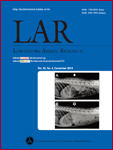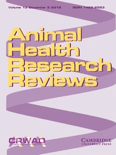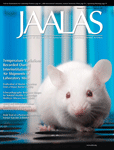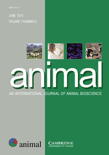
Laboratory Animal Research
Scope & Guideline
Unlocking the potential of laboratory animal science.
Introduction
Aims and Scopes
- Advancement of Animal Models:
The journal emphasizes the development and refinement of animal models that accurately replicate human diseases, thereby enhancing the translational potential of biomedical research. - Ethical and Welfare Standards:
A core focus is on promoting ethical standards and welfare practices in the use of laboratory animals, ensuring that research adheres to the principles of the 3Rs (Replacement, Reduction, Refinement). - Innovative Research Methodologies:
The journal supports the exploration of innovative research methodologies, including non-invasive imaging techniques and advanced biomolecular assessments, to improve experimental outcomes. - Interdisciplinary Approaches:
There is a strong emphasis on interdisciplinary research that combines insights from various fields, such as pharmacology, toxicology, and genetics, to foster comprehensive understanding and applications. - Preclinical Studies and Drug Development:
The journal serves as a platform for reporting preclinical studies that contribute to drug development processes, focusing on efficacy, safety, and mechanisms of action.
Trending and Emerging
- Precision Medicine and Personalized Approaches:
There is a growing trend towards research that explores precision medicine, utilizing genetically modified and specific animal models to better understand individualized responses to therapies. - Use of Artificial Intelligence in Research:
The incorporation of artificial intelligence in analyzing research data and optimizing experimental designs is increasingly prominent, suggesting a shift towards more data-driven methodologies. - Focus on Microbiome Research:
Recent publications show an increasing interest in the role of the microbiome in health and disease, highlighting its importance in research involving various animal models. - Neurobiology and Behavioral Studies:
Neuroscience-related studies, particularly those investigating the effects of interventions on behavior and cognition, are becoming more prevalent, reflecting an increased focus on brain function and its implications for human health. - Sustainability and Ethical Alternatives:
Emerging themes in sustainability and the exploration of ethical alternatives to traditional animal use are gaining traction, with researchers investigating plant-based models and computational methods.
Declining or Waning
- Traditional Toxicology Studies:
There is a noticeable decrease in publications focused solely on traditional toxicology studies, possibly due to a shift towards more integrated approaches that combine multiple endpoints and modern technologies. - Animal Models for Rare Diseases:
Research utilizing animal models specifically for rare diseases appears to be waning, likely as funding and interest shift towards more prevalent conditions with larger patient populations. - Comparative Studies of Common Laboratory Animals:
The number of studies comparing common laboratory animals has declined, suggesting a move towards more specialized models that provide greater insights into specific biological questions. - Basic Behavioral Studies:
There is a reduction in the frequency of basic behavioral studies in favor of more complex investigations that incorporate neurobiological and molecular analyses. - Historical Reviews of Animal Models:
While historical perspectives remain important, there is a decreasing trend in the publication of purely historical reviews, as newer, more dynamic discussions about current methodologies gain traction.
Similar Journals

BMC Veterinary Research
Connecting knowledge to enhance animal care.BMC Veterinary Research, published by BMC in the United Kingdom, stands as a pivotal open-access platform dedicated to advancing the field of veterinary science since its inception in 2005. With an impressive impact factor that reflects its influential presence, this journal has achieved a remarkable ranking of #17 out of 194 in the Scopus Veterinary category, placing it in the 91st percentile among its peers. The journal serves as an essential resource for researchers, professionals, and students alike, fostering the dissemination of high-quality research and innovative practices within the veterinary and broader medical communities. With its commitment to open access, BMC Veterinary Research ensures that valuable insights are accessible to all, promoting collaboration and knowledge sharing that drive the advancement of veterinary sciences. As it continues to publish significant findings until 2024, it remains a key contributor to the contemporary discourse on animal health and welfare.

Indian Journal of Animal Research
Cultivating Excellence in Animal Research and WelfareIndian Journal of Animal Research is a prominent publication in the field of animal science and veterinary medicine, established to advance the understanding of animal husbandry, biology, and health. Published by the AGRICULTURAL RESEARCH COMMUNICATION CENTRE, this journal has been contributing to the scholarly discourse since 2008, with a commitment to high-quality research dissemination. With its current Q3 ranking in both Animal Science and Zoology and Veterinary (miscellaneous) categories, it serves as a crucial platform for researchers aiming to share insights and innovations within these disciplines. Although it operates without open access, it remains widely recognized, fostering a collaborative academic environment. The journal's impact is underscored by its presence within the Scopus database, providing valuable rankings in both General Veterinary and Animal Science and Zoology fields. Researchers, professionals, and students interested in veterinary advancements and animal research will find this journal a valuable resource for the latest scientific findings and discussions. Join the community of scholars igniting progress in the vital realm of animal research.

REVISTA CIENTIFICA-FACULTAD DE CIENCIAS VETERINARIAS
Advancing veterinary science for a healthier tomorrow.REVISTA CIENTIFICA-FACULTAD DE CIENCIAS VETERINARIAS, published by the Universidad del Zulia, is a prominent open-access journal dedicated to advancing the fields of veterinary science, animal science, and food science. Since its inception in 1997, the journal has served as a vital platform for disseminating quality research and fostering academic dialogue among professionals and scholars in the veterinary and agricultural sectors. With its commitment to open access since 2010, the journal aims to make valuable research freely accessible to a global audience, thereby contributing to the advancement of scientific knowledge. Although currently categorized in the bottom quartile of various fields—including Animal Science and Zoology, Food Science, and Immunology—REVISTA CIENTIFICA-FACULTAD DE CIENCIAS VETERINARIAS is dedicated to nurturing innovative research that addresses pressing challenges in veterinary and related sciences. Researchers, professionals, and students will find this journal to be an important resource for quality studies that have implications for animal health, food safety, and biotechnology in the context of Venezuelan and international landscapes.

ANIMAL HEALTH RESEARCH REVIEWS
Pioneering comprehensive reviews for a healthier tomorrow.ANIMAL HEALTH RESEARCH REVIEWS, published by CAMBRIDGE UNIVERSITY PRESS, stands as a premier journal dedicated to advancing the field of animal health and welfare. With an impressive Scopus rank of #22 out of 490 in the domain of Animal Science and Zoology, placing it in the 95th percentile, this journal has established itself as a crucial resource for researchers and professionals alike. Covering the evolving landscape of animal health from 1996 to the present, it offers comprehensive reviews that synthesize current research, aiming to inform practices and policies in the animal health sector. Although it operates under a subscription model, the journal promotes access to cutting-edge findings and discussions. As a recognized publication in the Q1 category for 2023, it continues to set high standards for scholarship in animal science, making it an indispensable tool for those committed to advancing knowledge and practice in the field.

Journal of the American Association for Laboratory Animal Science
Fostering innovation and best practices in animal research.The Journal of the American Association for Laboratory Animal Science is a premier peer-reviewed publication dedicated to advancing the field of laboratory animal science. Published by the American Association for Laboratory Animal Science, this journal plays a crucial role in disseminating innovative research and fostering best practices in the care and use of laboratory animals. With an impressive Q1 ranking in the fields of Animal Science and Zoology and a significant Scopus ranking placing it in the 70th percentile among its peers, it stands as an influential resource for researchers, professionals, and students alike. The journal is committed to open access, ensuring that all findings are readily available to the academic community and beyond. By providing a platform for interdisciplinary dialogue and knowledge sharing, the journal contributes to the responsible and ethical advancement of laboratory animal science, which is vital for research integrity and animal welfare. With a publication timeline converging from 2006 to 2024, the Journal continues to evolve, addressing the dynamic challenges faced within the field.

Translational Animal Science
Transforming Animal Science into Practical SolutionsTranslational Animal Science, published by Oxford University Press Inc, stands as a prominent journal in the fields of Animal Science and Zoology as well as Veterinary Sciences, achieving a commendable Q2 ranking in both categories for 2023. With an E-ISSN of 2573-2102 and transitioning to an Open Access model since 2017, this journal fosters accessibility and dissemination of vital research that bridges the gap between basic animal science and its practical applications. The journal's significant impact factor, where it ranks in the 71st and 65th percentiles respectively for Veterinary and Agricultural and Biological Sciences disciplines, highlights its importance as a resource for emerging trends and innovations in animal research. With submissions accepted until 2024, Translational Animal Science not only contributes to advancing knowledge but also aims to engage a broad audience of researchers, professionals, and students dedicated to improving animal health and welfare. Based in India, the journal serves as an essential platform for the exchange of scientific ideas that facilitate progress within these vital fields.

Medycyna Weterynaryjna-Veterinary Medicine-Science and Practice
Innovating Animal Health Through Science and PracticeMedycyna Weterynaryjna-Veterinary Medicine-Science and Practice, published by the Polish Society of Veterinary Sciences Editorial Office, stands as a significant contributor to the field of veterinary medicine, focusing on various aspects of animal health and clinical practice. Established in 1945, this journal has continuously evolved, embracing the latest developments in veterinary science, making it an essential resource for researchers, professionals, and students alike. With an ISSN of 0025-8628, it is indexed in Scopus, currently ranked in the 22nd percentile within the Veterinary category, and has accordingly been placed in Q4 of the category quartiles as of 2023, reflecting its niche yet vital contributions to the field. Although currently not open access, the journal’s value is underscored by its dedication to disseminating scientific knowledge and advancements that enhance animal health and welfare in Poland and beyond. The editorial office is located in Lublin, Poland, serving as a hub for veterinary professionals seeking to publish and stay updated on contemporary issues in veterinary practice.

Animal
Pioneering discoveries that shape the world of animals.Animal is a leading academic journal published by Elsevier that stands at the forefront of research in the field of Animal Science and Zoology. Founded in 2007, it has rapidly garnered a prestigious reputation, achieving a remarkable Q1 ranking in its category for the year 2023, placing it in the top 4% of journals in the discipline. With an impressive impact, as indicated by its rank of 19 out of 490 in Agricultural and Biological Sciences on Scopus, this journal serves as a vital platform for researchers, professionals, and students to disseminate groundbreaking findings and interdisciplinary studies. Animal not only offers paid subscription access but also provides an option for Open Access, thereby enhancing the visibility and reach of significant research contributions. With its comprehensive scope and commitment to advancing the understanding of animal biology, behavior, and welfare, Animal plays a crucial role in shaping the future of animal science. For anyone invested in the environment, veterinary medicine, or wildlife management, this journal is an essential resource that fosters knowledge exchange and continued developments in the field.

ANIMAL SCIENCE PAPERS AND REPORTS
Exploring Innovations in Genetics and BiotechnologyANIMAL SCIENCE PAPERS AND REPORTS, published by the Polish Academy of Sciences, Institute of Genetics and Animal Biotechnology, is a distinguished platform for interdisciplinary research reflecting the evolving fields of Animal Science, Biotechnology, and Genetics. With an ISSN of 0860-4037 and an E-ISSN of 2300-8342, this journal serves as an essential resource for researchers and professionals aiming to advance their understanding and apply innovative methodologies in veterinary science and animal biotechnology. Despite being classified in Quartile 4 across several categories in 2023 and noting a notable country-based focus in Poland, it continues to provide valuable insights into animal genetics and biotechnological advancements, particularly as it converges its content from 2007 to 2024. While currently not an open access journal, ANIMAL SCIENCE PAPERS AND REPORTS is committed to upholding academic rigor, making it a key asset for students, researchers, and industry professionals looking to contribute to and stay informed in these vital scientific areas.

Revista MVZ Cordoba
Bridging academia and practice in Animal Science and Zoology.Revista MVZ Cordoba, an esteemed publication of UNIV CORDOBA, is a pivotal resource for researchers and practitioners in the fields of Animal Science, Zoology, and Veterinary Medicine. Established as an Open Access journal since 2000, it facilitates widespread accessibility of scholarly articles from Colombia, fostering global collaboration and knowledge dissemination. The journal has demonstrated its commitment to quality, holding Q4 quartile rankings in 2023 across various categories including Animal Science and Zoology, and Aquatic Science. Despite its current challenges in rankings, with percentiles in the lower brackets, it represents an important platform for the advancements in these disciplines, specifically catering to emerging research and insights. The journal's annual publication cycle from 2008 to 2024 ensures that it remains timely and relevant in covering contemporary issues within veterinary science and related areas. For researchers, professionals, and students, Revista MVZ Cordoba stands out as a valuable avenue for the exploration of veterinary sciences within a diverse academic landscape.